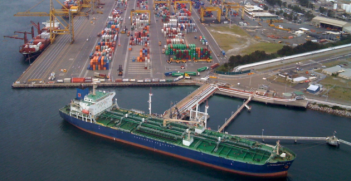Holding a Wolf by the Ears: The Conflict Between Chinese Trade Restrictions and Domestic Demand

There are rumblings that Chinese embargoes on Australian coal are having adverse economic impacts on dependent cities. How far will China’s “wolf warrior” diplomacy go in the interests of national image and pride, when doing so guarantees material detriment?
In a lengthy address at the opening of China’s 19th Party Congress in 2017, Chinese General Secretary Xi Jinping outlined a vision of “national rejuvenation.” In simple terms, Chinese Community Party (CCP) leadership would strive towards two ideals. The first is the stability and prosperity of the Chinese people, through increased security, social harmony, and economic growth. The second (and more treacherous) ideal was one of national pride and greatness: Xi referred to China as a great or strong power twenty-six times in his speech.
China has chosen to enmesh the credibility of the CCP with its international ambitions, hedging its own future and that of the domestic political system itself on its pursuit of regional dominance. This raises a question aptly posed by the esteemed Rory Medcalf in his 2020 book, Indo-Pacific Empire: “what happens when, within the one government, a nationalist compulsion to upset the regional order clashes with a lingering economic need to maintain some of its benefits?”
There are glimmers of this conflict of interests arising amidst recent Sino-Australian tensions. The embargo on Australian coal means that parts of China are struggling to keep the lights on. Over a dozen Chinese cities have imposed restrictions on electricity use, with businesses and households being asked to lower consumption. In an extreme example, the city of Yiwu has switched off all its street lights at night and made factories cut working hours by up to 80 percent until the end of the year.
Amid so much discussion of Australian dependency on China, it is sometimes forgotten that Australia is an important exporter of many goods to China – especially commodities, the essential building blocks for economic growth and pandemic recovery. Although official data indicates that Chinese energy plants used three percent Australian coal, that proportion could exceed ten percent in some provinces. The situation is even plainer with iron ore: Australia provides 60 percent of China’s imports of iron ore.
None of this is to diminish the seriousness of trade restrictions imposed, which are a major source of concern for many Australian businesses. The decline in Australia’s relationship with China is undoubtedly damaging. Yet Australia, and the world at large, must watch closely as this case study unfolds. How far is China willing to go for the sake of patriotism and promised greatness, when there are clear and calculable economic repercussions at home?
Xi is left with a conundrum as he faces his “wolf warrior” diplomats, hungry to sacrifice material prosperity for pride in one international altercation or another. As the Roman playwright Terrence wrote, “I’ve got a wolf by the ears; for I neither know how to get rid of her, nor yet how to keep her.”
This is not the first time that China’s “wolf warrior” diplomacy has backfired. In October, threatening remarks about the safety of Canadians in Hong Kong led Prime Minister Justin Trudeau to respond with uncharacteristic sharpness. “There are signs that Canada is becoming more determined and resolute,” said David Mulroney, a former Canadian ambassador to China.
When China temporarily banned the export of rare earth minerals to Japan in 2010, this led to Japanese efforts to make supply chains more diverse and resilient. As a result, Japan was weaned off Chinese rare earth mineral exports. China, on the other hand, has since become a net importer of many rare earth minerals. It is instructive that, despite sabre-rattling, China has so far decided against imposing a similar export ban on rare earth minerals to the United States amid growing trade and technological competition. Others are now re-evaluating their supply chains too, in light of uncomfortable relationships with China as well as the lessons of supply chain vulnerability learned from the pandemic. The United States and the European Union are looking to mitigate their dependency on Chinese minerals. Australia and Russia are trying to play host to the trend.
In short, the very same economic and strategic heft which enables China to strong-arm other states is also a source of vulnerability. Steering the Chinese ship is an exercise in managing expectations en masse. China faces substantial challenges: its economy has been slowing for a decade, an ageing population places increasing strain on the working population and resources, and the level of income inequality is approaching that of the United States.
Will it add to its existing woes by bring about self-defeating economic burdens? To an extent, perhaps. But the balance to be struck between Chinese prosperity and pride is yet to be finally settled. Even in an increasingly authorisation state, much depends on how economic repercussions play out with the Chinese people. The CCP cannot abide an unsettled population, smarting from the loss of material benefits merely for the sake of keeping face on the international stage.
“We don’t expect the government to relax import control just because of the trouble it has caused,” said an official at Huadian Corporation, one of China’s largest energy groups, speaking on disruptions caused by bans on Australian coal. “Politics come first.”
Only time will tell which ideal will prevail in the event of continued conflict: economic growth and stability, or national and international image as a great power. Better yet for China, it may be that the CCP will grow to find a comfortable middle ground in which it can pursue both of these ideals simultaneously, rather than sacrificing prosperity on the altar of national pride. Thus far, however, the scales remain unbalanced.
Kiara van Hout is a final year Law student at St John’s College, University of Cambridge. Her research interests include international human rights law and international dispute settlement.
This article is published under a Creative Commons Licence and may be republished with attribution.




